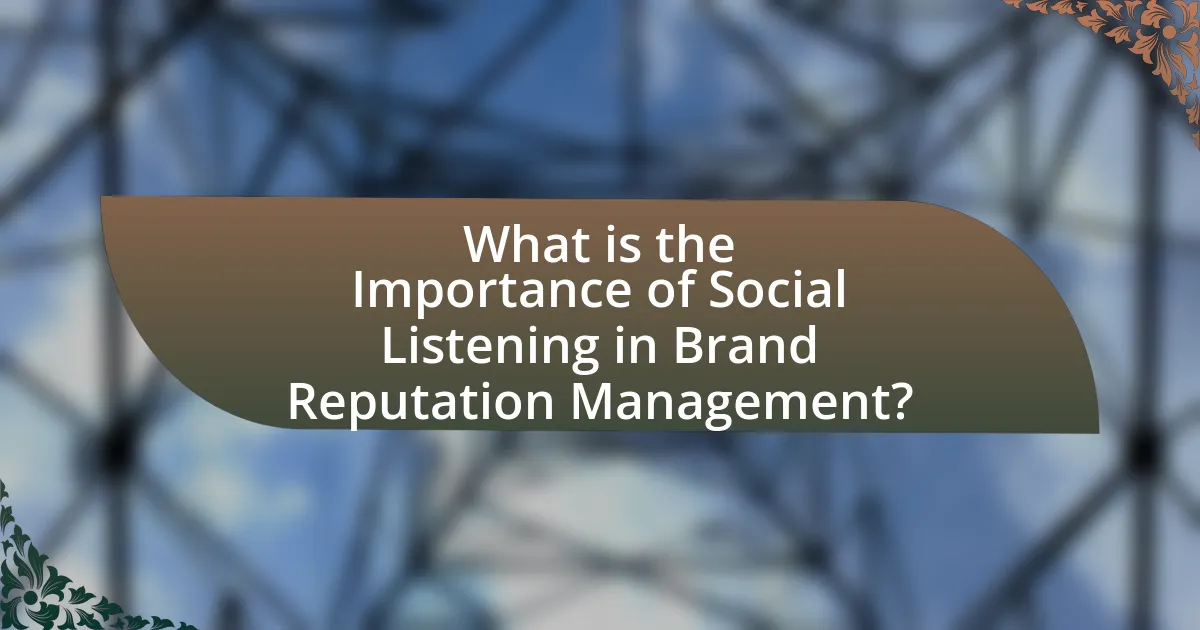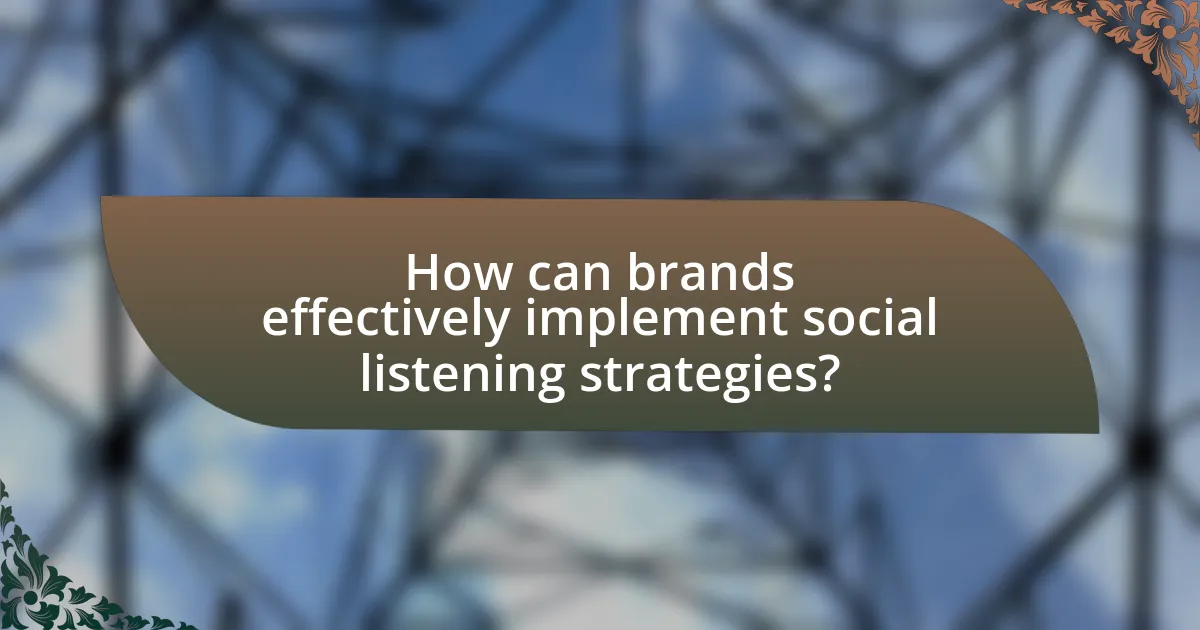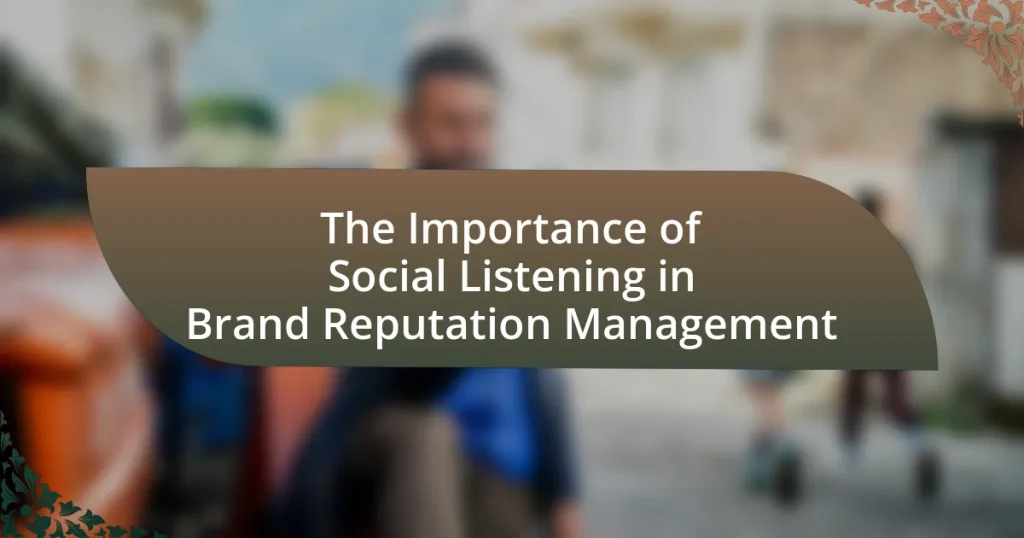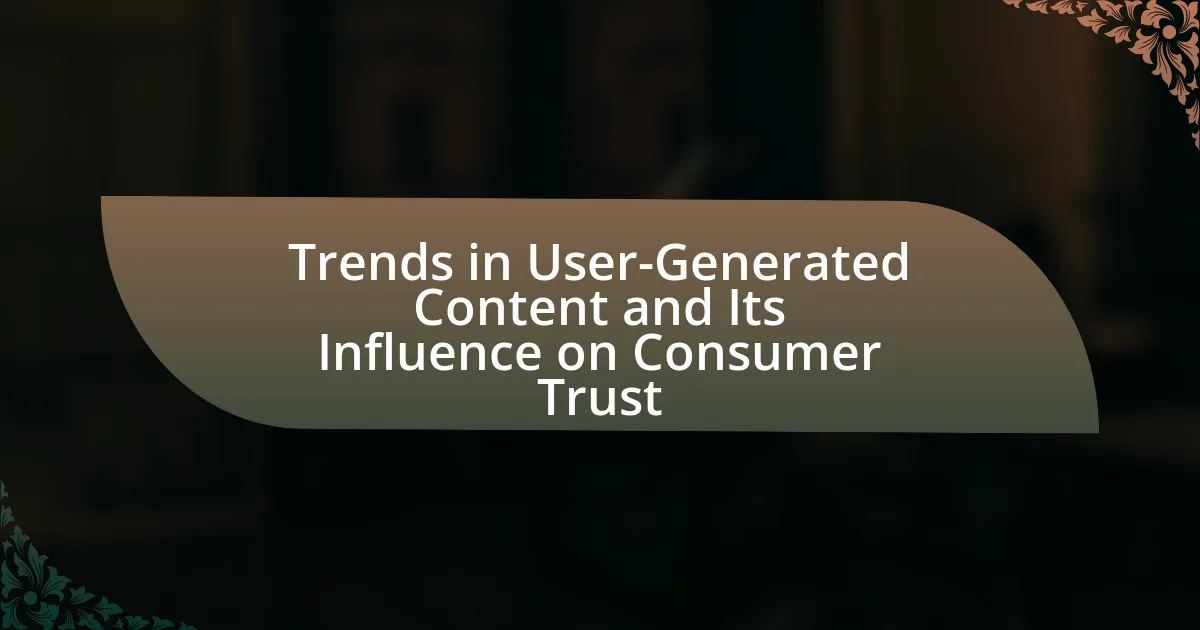The article focuses on the significance of social listening in brand reputation management. It highlights how social listening allows companies to monitor online conversations, analyze customer sentiments, and address issues in real-time, thereby enhancing brand loyalty and perception. Key tools for effective social listening, such as Hootsuite and Brandwatch, are discussed, along with their role in sentiment analysis and crisis management. The article also emphasizes the importance of engaging with customers through social listening to foster trust and loyalty, while outlining best practices and challenges brands may face in implementing these strategies.

What is the Importance of Social Listening in Brand Reputation Management?
Social listening is crucial in brand reputation management as it enables companies to monitor and analyze online conversations about their brand. By actively engaging in social listening, brands can identify customer sentiments, address potential issues promptly, and adapt their strategies based on real-time feedback. For instance, a study by Sprout Social found that 70% of consumers are more likely to recommend a brand that responds to their social media inquiries, highlighting the direct impact of social listening on customer loyalty and brand perception.
How does social listening contribute to understanding brand perception?
Social listening significantly contributes to understanding brand perception by analyzing real-time conversations and sentiments expressed by consumers across various platforms. This analysis allows brands to gauge public opinion, identify trends, and detect potential issues related to their products or services. For instance, a study by Sprout Social found that 70% of consumers are more likely to recommend a brand that actively listens to their feedback. By leveraging social listening tools, brands can collect data on customer sentiments, enabling them to adjust their strategies and improve their reputation based on direct consumer insights.
What tools are used for effective social listening?
Effective social listening tools include Hootsuite, Brandwatch, Sprout Social, and Mention. These platforms enable brands to monitor social media conversations, track brand mentions, and analyze sentiment. For instance, Brandwatch provides advanced analytics and insights from millions of online sources, allowing brands to understand public perception and respond accordingly. Hootsuite integrates various social media channels, facilitating real-time engagement and reporting. Sprout Social offers comprehensive reporting features that help brands measure their social media performance. Mention allows users to track brand mentions across the web, providing alerts for immediate response opportunities. These tools collectively enhance a brand’s ability to manage its reputation effectively by providing actionable insights and facilitating timely engagement.
How do these tools analyze consumer sentiment?
These tools analyze consumer sentiment by employing natural language processing (NLP) algorithms to assess and interpret the emotions expressed in online content. They scan social media posts, reviews, and comments to identify positive, negative, or neutral sentiments through techniques such as sentiment scoring and keyword extraction. For instance, a study by Liu (2012) in the “Journal of Computer Science and Technology” highlights that sentiment analysis can classify text data with an accuracy rate exceeding 80% when using advanced machine learning models. This capability allows brands to gauge public perception and respond effectively to consumer feedback, thereby enhancing their reputation management strategies.
Why is social listening critical for brand reputation?
Social listening is critical for brand reputation because it enables companies to monitor and analyze public sentiment about their brand in real-time. By actively engaging with customer feedback and conversations on social media platforms, brands can identify potential issues, respond to customer concerns promptly, and adapt their strategies to align with consumer expectations. Research indicates that 78% of consumers are more likely to trust a brand that responds to their feedback, highlighting the importance of social listening in fostering trust and loyalty. Additionally, brands that leverage social listening can proactively manage crises, as 70% of consumers expect brands to take action on social issues, further underscoring its role in maintaining a positive brand image.
What role does social listening play in crisis management?
Social listening plays a critical role in crisis management by enabling organizations to monitor and analyze public sentiment in real-time. This proactive approach allows brands to identify potential issues before they escalate into full-blown crises, facilitating timely responses that can mitigate damage to reputation. For instance, a study by the Institute for Public Relations found that 70% of consumers expect brands to respond to negative comments within 24 hours, highlighting the necessity of social listening for effective crisis communication. By leveraging social media analytics tools, companies can track mentions, gauge public reaction, and adjust their messaging accordingly, ensuring they remain aligned with audience expectations during turbulent times.
How can social listening help in identifying brand advocates?
Social listening helps in identifying brand advocates by analyzing online conversations and sentiments related to a brand. By monitoring social media platforms, brands can detect positive mentions, engagement levels, and user-generated content that highlight enthusiastic customers. For instance, a study by Sprout Social found that 70% of consumers are more likely to recommend a brand after a positive interaction on social media. This data indicates that social listening not only uncovers who is actively promoting a brand but also provides insights into the characteristics and behaviors of these advocates, enabling brands to foster stronger relationships with them.

What are the key benefits of implementing social listening?
Implementing social listening provides brands with the ability to monitor and analyze online conversations about their products, services, and industry. This practice enables companies to gain insights into customer sentiments, preferences, and emerging trends, which can inform marketing strategies and product development. For instance, a study by Sprout Social found that 70% of consumers are more likely to recommend a brand that responds to their social media inquiries, highlighting the importance of engagement in building brand loyalty. Additionally, social listening helps identify potential crises early, allowing brands to address issues proactively and maintain a positive reputation.
How does social listening enhance customer engagement?
Social listening enhances customer engagement by allowing brands to monitor and analyze conversations about their products and services in real-time. This practice enables companies to understand customer sentiments, preferences, and pain points, leading to more personalized interactions. For instance, a study by Sprout Social found that 70% of consumers feel more connected to brands that respond to their social media inquiries, demonstrating that active engagement based on social listening can foster stronger customer relationships. By leveraging insights gained from social listening, brands can tailor their marketing strategies and improve customer service, ultimately driving higher engagement levels.
What strategies can brands use to engage with customers through social listening?
Brands can engage with customers through social listening by actively monitoring and analyzing online conversations to understand customer sentiments and preferences. This strategy allows brands to identify trends, respond to customer inquiries in real-time, and tailor their marketing efforts based on feedback. For instance, a study by Sprout Social found that 70% of consumers feel more connected to brands that respond to their social media posts, highlighting the effectiveness of timely engagement. Additionally, brands can use insights gained from social listening to create personalized content and campaigns, fostering a deeper relationship with their audience.
How does engagement through social listening impact brand loyalty?
Engagement through social listening significantly enhances brand loyalty by fostering a deeper connection between the brand and its customers. When brands actively monitor and respond to customer feedback on social media, they demonstrate that they value customer opinions and are committed to addressing their needs. This responsiveness builds trust, as evidenced by a study from Sprout Social, which found that 70% of consumers are more likely to be loyal to a brand that responds to their social media inquiries. Additionally, brands that engage in social listening can tailor their offerings based on customer insights, leading to improved customer satisfaction and retention. This proactive approach not only strengthens customer relationships but also encourages repeat purchases, ultimately solidifying brand loyalty.
What insights can brands gain from social listening?
Brands can gain valuable insights from social listening, including customer sentiment, emerging trends, and competitive analysis. By monitoring social media conversations, brands can assess how consumers feel about their products or services, which helps in identifying areas for improvement. For instance, a study by Sprout Social found that 70% of consumers feel more connected to brands that respond to their social media inquiries, indicating that engagement can enhance brand loyalty. Additionally, social listening allows brands to spot trends early, enabling them to adapt their strategies accordingly. According to a report by Hootsuite, 54% of social media users want brands to connect with them, highlighting the importance of understanding audience preferences through social listening. Lastly, analyzing competitors’ social media presence can provide insights into market positioning and consumer expectations, allowing brands to refine their own strategies effectively.
How can social listening inform product development?
Social listening can inform product development by providing insights into customer preferences, pain points, and emerging trends. By analyzing conversations and feedback on social media platforms, brands can identify specific features or improvements that consumers desire. For instance, a study by Sprout Social found that 70% of consumers are more likely to buy from a brand that listens and responds to their feedback. This data demonstrates that integrating social listening into product development can lead to more customer-centric offerings, ultimately enhancing brand loyalty and market competitiveness.
What competitive advantages can be gained through social listening?
Social listening provides competitive advantages by enabling brands to understand customer sentiment, monitor industry trends, and identify emerging issues. By analyzing conversations on social media, companies can gain insights into consumer preferences and pain points, allowing them to tailor their products and services accordingly. For instance, a study by Sprout Social found that 70% of consumers are more likely to recommend a brand that responds to their social media inquiries, highlighting the importance of engagement in building loyalty. Additionally, social listening helps brands stay ahead of competitors by tracking their strategies and customer feedback, allowing for proactive adjustments in marketing and communication efforts.

How can brands effectively implement social listening strategies?
Brands can effectively implement social listening strategies by utilizing advanced analytics tools to monitor online conversations and sentiment about their products and services. These tools enable brands to track mentions across various social media platforms, forums, and blogs, providing real-time insights into consumer opinions and trends. For instance, a study by Sprout Social found that 70% of consumers are more likely to recommend a brand that responds to their social media inquiries, highlighting the importance of engagement in social listening. By analyzing this data, brands can identify key themes, address customer concerns promptly, and adapt their marketing strategies to align with consumer expectations, ultimately enhancing brand reputation and loyalty.
What steps should brands take to start social listening?
Brands should begin social listening by identifying relevant platforms and tools to monitor conversations about their brand. This involves selecting social media channels, forums, and review sites where their audience engages. Next, brands should define specific keywords and phrases related to their products, services, and industry to track mentions effectively. Implementing social listening tools, such as Hootsuite or Brandwatch, allows brands to gather and analyze data efficiently. Finally, brands must establish a process for responding to insights gained from social listening, ensuring they can engage with customers and address concerns promptly. This structured approach enables brands to enhance their reputation and adapt to consumer feedback effectively.
How can brands define their social listening goals?
Brands can define their social listening goals by identifying specific objectives that align with their overall marketing and communication strategies. This involves determining what insights they seek, such as understanding customer sentiment, tracking brand mentions, or identifying emerging trends. For instance, a study by Sprout Social found that 70% of consumers expect brands to understand their needs and expectations, highlighting the importance of setting clear goals to enhance customer engagement and brand loyalty. By establishing measurable targets, brands can effectively evaluate their social listening efforts and adjust strategies accordingly.
What metrics should brands track to measure social listening success?
Brands should track engagement metrics, sentiment analysis, share of voice, and response time to measure social listening success. Engagement metrics, such as likes, shares, and comments, indicate how well the audience interacts with brand content. Sentiment analysis helps brands understand public perception by categorizing mentions as positive, negative, or neutral, providing insight into brand reputation. Share of voice measures a brand’s presence compared to competitors, revealing market positioning. Response time reflects how quickly brands address customer inquiries or feedback, impacting customer satisfaction and loyalty. Collectively, these metrics provide a comprehensive view of social listening effectiveness and its influence on brand reputation management.
What are common challenges in social listening?
Common challenges in social listening include data overload, sentiment analysis accuracy, and platform diversity. Data overload occurs when brands receive vast amounts of unstructured data from various social media channels, making it difficult to identify relevant insights. Sentiment analysis accuracy is often compromised due to the nuances of language, such as sarcasm or cultural context, which can lead to misinterpretation of consumer opinions. Additionally, platform diversity presents a challenge as different social media platforms have unique user behaviors and content types, requiring tailored approaches for effective listening. These challenges hinder brands’ ability to effectively monitor and respond to consumer feedback, impacting their reputation management efforts.
How can brands overcome data overload in social listening?
Brands can overcome data overload in social listening by implementing advanced analytics tools that filter and prioritize relevant data. These tools utilize machine learning algorithms to analyze vast amounts of social media content, identifying key themes, sentiments, and trends that matter most to the brand. For instance, a study by Gartner indicates that organizations using AI-driven analytics can reduce data processing time by up to 70%, allowing brands to focus on actionable insights rather than sifting through irrelevant information. By adopting these technologies, brands can streamline their social listening efforts, ensuring they respond effectively to consumer feedback and maintain a positive reputation.
What ethical considerations should brands keep in mind while listening socially?
Brands should prioritize user consent and privacy when engaging in social listening. This means obtaining explicit permission from individuals before collecting or analyzing their data, as mandated by regulations like the General Data Protection Regulation (GDPR). Additionally, brands must ensure transparency about how they use the information gathered, fostering trust and accountability. Ethical social listening also involves avoiding manipulation or exploitation of consumer sentiments, which can damage brand reputation. Research indicates that 79% of consumers are concerned about how their data is used, highlighting the importance of ethical practices in maintaining a positive brand image.
What best practices should brands follow for effective social listening?
Brands should follow several best practices for effective social listening, including defining clear objectives, utilizing the right tools, and engaging with the audience. Defining clear objectives helps brands focus on specific goals, such as improving customer satisfaction or identifying emerging trends. Utilizing the right tools, such as social media monitoring software, enables brands to track mentions, sentiment, and engagement across various platforms efficiently. Engaging with the audience by responding to comments and feedback fosters a positive relationship and enhances brand reputation. According to a study by Sprout Social, 70% of consumers feel more connected to brands that respond to them on social media, highlighting the importance of active engagement in social listening strategies.
How can brands ensure they are responsive to consumer feedback?
Brands can ensure they are responsive to consumer feedback by implementing a structured social listening strategy that actively monitors and analyzes customer sentiments across various platforms. This involves utilizing tools that track mentions, comments, and reviews in real-time, allowing brands to identify trends and address concerns promptly. For instance, a study by Sprout Social found that 70% of consumers expect brands to respond to their feedback within 24 hours, highlighting the necessity for timely engagement. By prioritizing responsiveness, brands can enhance customer satisfaction and loyalty, ultimately improving their reputation in the market.
What role does continuous improvement play in social listening strategies?
Continuous improvement is essential in social listening strategies as it enables brands to adapt and enhance their engagement based on real-time feedback and evolving consumer sentiments. By systematically analyzing social media interactions and feedback, brands can identify trends, address issues promptly, and refine their messaging to better resonate with their audience. For instance, a study by Gartner found that organizations that actively engage in continuous improvement of their social listening practices see a 20% increase in customer satisfaction and loyalty. This iterative process not only strengthens brand reputation but also fosters a more responsive and customer-centric approach, ultimately leading to sustained competitive advantage.




